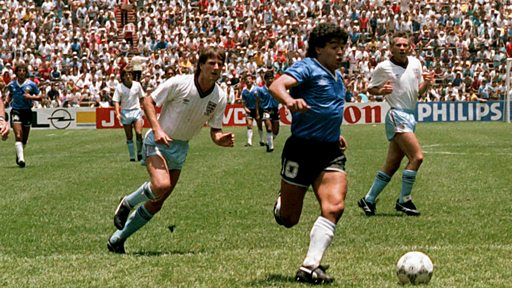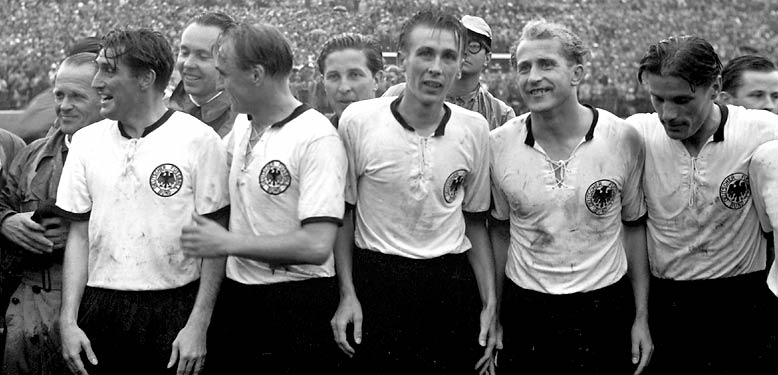God.
There are greats in soccer and then there are the legends. For some reason, one cannot put Diego Maradona in either of the two brackets. To call him a great would be an insult to the sheer brilliance of his footballing abilities and making him a legend will be callous on our behalf, as we would be ignoring the many faults that marred his genius.
Is there a better way to talk about Diego Maradona than to talk about his most atrocious antic ever?
The English hate him for it, but the rest of the world recognized it as a moment that defined the outcome of the 1986 World Cup in Mexico.
It ended like this…

The feet of God.
Somewhere in his own half, Diego Maradona picks up the ball and executes a pull-back, twice, to outwit the Peter’s (Beardsley and Reid). Skips past Terry Butcher, Steve Hodge and Terry Fenwick with magnificent ball control and elusive change of pace, with only Shilton in between him and glory now. Moves coolly in control to finish the shot and slot it into the net.
Never before had a player jinxed past so many defenders in one move and then scored one of the sweetest goal’s ever seen, at such a tournament.
Four minutes earlier however, there was only acrimony. The God’s hand had something to do with it.
The score was level, with no breakthrough from either sides. But Maradona had to do something about it. It was about having to win against the English, and not about progressing in the tournament. He had that irrepressible urge to cheat, to kill the maker’s of the game, at their own game.
In the 51st minute, Maradona played the ball out-wide to Jorge Valdano, only to be dispossessed by England’s Steve Hodge, who kicked it hard enough to spill the ball back into England’s own penalty area. Then, God happened.
This mistake on Hodge’s part set up an aerial duel between England goalkeeper, Peter Shilton and the diminutive Maradona, separated from each other by 8 inches in stature. Shilton won?
No. Maradona extended his left hand to punch the ball into England’s net and score the most controversial goal in football’s history. Tunisian referee, Ali Bin Nasseer failed to spot the hand ball and the goal stood despite numerous requests from Shilton and the rest of the England squad.
Maradona had to cheat. That’s what makes him walk the fine line between a great and a legend. Growing up in Buenos Aires, Maradona was obviously moulded by the school of hard knocks. To live and win in such an environment, one must couple effort with risks, and ensure that the risk pays off. That is exactly what the God did. To guise his hand’s movement and make the effort seem like a header, was evidence enough of Maradona’s brilliance and not his cheekiness.
For some reasons, it was more than a win for the Argentinians. In 1982, in the Falklands War, the Britons had slaughtered over 600 Argentinians, most of whom were children or teenagers. As Maradona said about it in his autobiography,
“This was revenge. It was like recovering a little bit of the Malvinas. In the pre-match interviews we had all said that football and politics shouldn’t be confused, but that was a lie. We did nothing but think about that.”
Maradona’s second goal was proof of his God-like abilities, but the cheeky genius inside him wouldn’t mask his feelings of mischief for the first one. 24 years to that day, Maradona had to talk about it and he did.
“Sometimes I think I almost enjoyed that one more, the first one. Now I feel I am able to say what I couldn’t then. At the time I called it ‘the hand of God’. Was it the hand of God, it was the hand of Diego! And it felt a little bit like pickpocketing the English…”
Two moments that defined the 1986 tournament, reflected Maradona’s impact in Argentina. The God is recognized as a culture in the football crazy Latin American nation. The deity took the tournament by storm and made it his own.
The Miracle of Berne.
Hungary’s Mighty/Magical Magyar’s. Gusztav Sebes’s dream XI that had never been beaten in 32 games, over a span of four years. The team that had humbled the mighty English squad at Wembley and in Budapest. Beat the mighty Brazil at the same venue where they would eventually succumb to West Germany.

They lifted the Jules Rimet trophy that day.
Incidentally, West Germany had been humiliated in the 1954 World Cup, 8-3 in the group stages earlier and were on course for yet another lesson in pain.
Rewinding back to the finals, Hungary had an early 2 goal lead, courtesy of Zoltan Czibor and Ferenc Puskas.
But within two minutes, West Germany were back in the game, after a goal from Max Morlock and were level pegging ten minutes later due to Helmut Rahn.
The Germans had been humiliated earlier in the tournament, but they had made notes of their faults and were keen to restore pride, the next time they met Sebes’s indomitable XI.
Most importantly, Puskas was not fully fit. He had been inserted back into the squad and wasn’t really able to keep up to his cutting edge standards. Secondly, Hidegkuti was kept at bay. The Germans inserted a man-marker in their own squad to check the flow of the Hungarian team. When the Hungarians failed to advance with their usual vigor, the German goalkeeper, Toni Turek, could stop the final advance of the Hungarians with relative ease.
With six minutes of regular play remaining, Helmut Rahn scored West Germany’s third goal, the winner. Puskas could have equalized towards the end, though the attempt was ruled as an offside by the Welsh linesman. And then, the Germans for the first time in their history, raised the Jules Rimet trophy at Berne.
“We are somebody again.”
They didn’t say it in English as quoted above, but that’s what they meant in their own tongue in West Germany.
“The reaction in Hungary was terrible. Hundreds of thousands of people poured into the streets in the hours after the match. On the pretext of football, they demonstrated against the regime… In those demonstrations, I believe, lay the seeds of the 1956 uprising.”
-Hungarian goalkeeper, Gyuli Grosics
After this game, Hungarian football went into decline forever, while the Germans rose from their ashes and made the rest of Europe, take notice of it.
West Germany’s first World Cup win came at a time when they were beginning to rise from the ashes of the 2nd World War, which saw the nation being split into blocks governed by two regimes, who vastly differed in their ideologies. The win pumped into the citizens much confidence and vigor which was necessary in the days of guilt and repression in the post-War years.
Hungary’s Magical Magyars, one of the greatest national teams ever assembled went into decline, as the Communist-run nation sunk into itself and player’s like Puskas, Kocsis and Czibor left for brighter glories in Spain. Gusztav Sebes was sacked in 1956 to be replaced by Marton Bukovi.
Hungary’s Golden Team though contributed in more ways than one to modern football. New tactics were introduced which broke the over reliance of teams on the W-M formation. The effectiveness of player training was enforced upon and most importantly, they lay the foundations of a concept that the Dutch would later brand as their own. Total football.
Germany, post-Berne went on to win two more World Cup’s in 1974 and 1990, while Hungarian football was obscured forever.
Also a writer at The Rational Pie, Sportskeeda and The Football Story.
- Everton on the wane: Unwrapping the problems at Goodison Park - March 19, 2015
- How do Netherlands & Argentina’s key players compare statistically? - July 9, 2014
- 3 Key Questions | Netherlands vs Costa Rica: World Cup quarter-final - July 5, 2014





















































